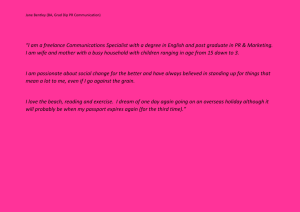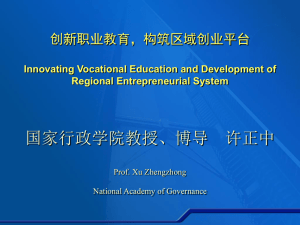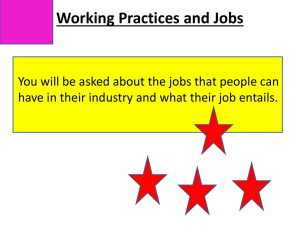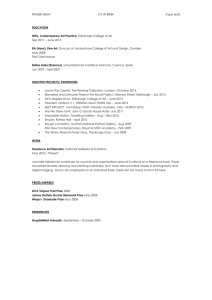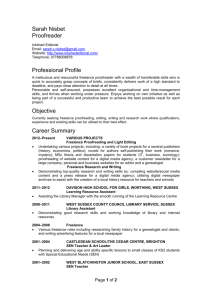disrupting disciplines v3
advertisement
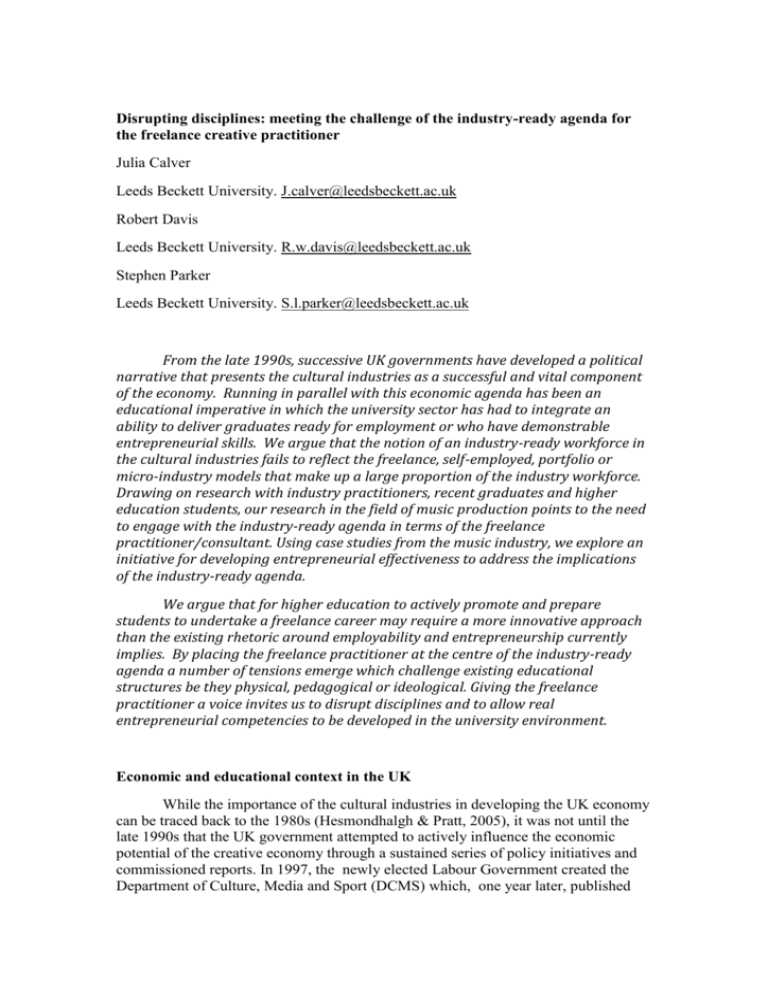
Disrupting disciplines: meeting the challenge of the industry-ready agenda for the freelance creative practitioner Julia Calver Leeds Beckett University. J.calver@leedsbeckett.ac.uk Robert Davis Leeds Beckett University. R.w.davis@leedsbeckett.ac.uk Stephen Parker Leeds Beckett University. S.l.parker@leedsbeckett.ac.uk From the late 1990s, successive UK governments have developed a political narrative that presents the cultural industries as a successful and vital component of the economy. Running in parallel with this economic agenda has been an educational imperative in which the university sector has had to integrate an ability to deliver graduates ready for employment or who have demonstrable entrepreneurial skills. We argue that the notion of an industry-ready workforce in the cultural industries fails to reflect the freelance, self-employed, portfolio or micro-industry models that make up a large proportion of the industry workforce. Drawing on research with industry practitioners, recent graduates and higher education students, our research in the field of music production points to the need to engage with the industry-ready agenda in terms of the freelance practitioner/consultant. Using case studies from the music industry, we explore an initiative for developing entrepreneurial effectiveness to address the implications of the industry-ready agenda. We argue that for higher education to actively promote and prepare students to undertake a freelance career may require a more innovative approach than the existing rhetoric around employability and entrepreneurship currently implies. By placing the freelance practitioner at the centre of the industry-ready agenda a number of tensions emerge which challenge existing educational structures be they physical, pedagogical or ideological. Giving the freelance practitioner a voice invites us to disrupt disciplines and to allow real entrepreneurial competencies to be developed in the university environment. Economic and educational context in the UK While the importance of the cultural industries in developing the UK economy can be traced back to the 1980s (Hesmondhalgh & Pratt, 2005), it was not until the late 1990s that the UK government attempted to actively influence the economic potential of the creative economy through a sustained series of policy initiatives and commissioned reports. In 1997, the newly elected Labour Government created the Department of Culture, Media and Sport (DCMS) which, one year later, published the Creative Industries Mapping Document (DCMS, 1998) representing their first attempt to quantify the economic and employment potential of the creative industries. Alongside this initiative, the National Advisory Committee on Creative and Cultural Education (NACCCE), reporting jointly to the Secretary for State for Education and Employment and the Secretary of State for Culture, Media and Sport, produced All Our Futures: Creativity, Culture and Education (NACCCE, 1999). The NACCCE report recommended that the key areas of industrial and educational policy be brought together in order to support the development of key corporations ‘in the fields of communications, information, entertainment, science and technology’ (NACCCE, 1999: 19). These initiatives were to develop into a significant narrative which was to have, and continues to have, a profound effect on educational policy in the UK. Initial estimates prepared by the DCMS in 1998 suggested that the cultural industries generated annual revenues of over £57 billion and employed more than 1.7 million people (NACCCE, 1999, pp.19-20). By 2014, these estimates had been upgraded to indicate that the Creative Industries, now a clearly defined subset of the Creative Economy, accounted for 5.2% of Gross Value Added (GVA for 2012) or £71.4 billion. Employment for the creative economy accounts for and estimated 2.55 million jobs and the creative industries itself is estimated to account for 1.68 million jobs or 5.6% of the UK workforce (DCMS, 2014, p. 5). The economic strength of the creative industries has become such that in November 2014 a newly created nonGovernmental organization, The Creative Industries Federation (CIF) has been created with support from more than 220 companies including film, television, publishing, fashion and the arts. The organization is being promoted as an independent lobbying group that will represent the creative industries in the same way that the Confederation of British Industries (CBI) represents independent employers. The relationship between higher education and the economy was cemented in 2009 when the Department for Business, Innovation and Skills incorporated higher education as part of its remit. Further reports such as Higher Ambitions: The Future of Universities in a Knowledge Economy (2013) aimed to build a ‘consensus between individuals, government, and employers as to how our higher education system should be supported, adapted and expanded’ (BIS, 2013). The implication of the report was that major changes would be required to ‘expand new types of higher education programmes that widen opportunities…to reflect the reality of the modern working lives’ (BIS, 2013, p. 6). While policy shifts and the reorganization of government departments pointed towards a bringing together of education and industry, the picture emerging from publications such as the Manifesto for the Creative Economy (NESTA, 2013) provided a stark reminder of the disconnect between education and employment. Evidence suggests that most universities haven’t been producing the kind of talent that the creative industries demand. We see this in the poor employment outcomes of graduates from creative media specialist degrees evidenced in Next Gen1 (only 12 per cent of those graduating from games courses secured employment in the industry within six months of leaving university) and other studies (Bakhshi et al. 2013, p. 103). 1 See http://www.nesta.org.uk/sites/default/files/next_gen_wv.pdf The implication of this report is that there is a potential disconnect between the skills used in education and the skills demanded by employers that policy initiatives alone have failed to reconcile. In his reflections on the music industries, O’Hara points out that, There are two parallel worlds – one of a growing field of education and the other of an increasingly complex industry that largely ignores the existence of the education programs. There has not been much thought give to best practice in linking the courses to the as yet undeclared needs of the music industry (O’Hara. 2014, p 28). The changing characteristics of the music industries over the past few years (Williamson, & Cloonan, 2007) underlines a further problem for developing a direct relationship between higher education courses and employment, a situation which is replicated in other areas of the creative and cultural industries. A further problem has been that the agenda has been dominated by a discourse which has privileged the ‘interaction between large organizations and SMEs’ (Culkin & Malick, 2011). However, this may be an inappropriate model for the cultural industries and for the music industry in particular which has, according to Ball et al., seen ‘a drift away from work in medium‐sized enterprises to micro‐businesses [which] is consistent with recent changes in the sector’ (Ball et al., 2010, p. 3). Drawing on a longitudinal study of creative graduates, Ball noted that: 45 per cent of graduates had worked on a freelance basis and around one‐quarter had started a business during their early careers… Self‐employment is a serious career entry strategy and feature of portfolio working, as well as reflecting the way in which work is organized in the creative sector – a predominantly contract economy (Ball et al., 2010, p. 28). We have presented this extended contextual account and outlined some of the political, educational and philosophical narratives that have influenced our thinking. The UK account will, in some ways, will mirror the experience of other countries whose governments will have developed their own response to the cultural industries and from this their own educational agendas (European Commission, 2006, 2008; World Economic Forum, 2009). For the UK, while policy is set centrally, it is for each university or higher education provider to determine their response to the workready agenda. As a University, we are also concerned with the wider cultural economy and have a wide range of courses including film, game design, performing arts, art and design and music, as well as a range of courses in events management and related areas of tourism and hospitality. Our institutional response is, as follows most institutions in the university sector, centered around a number of institutional and school-based initiatives including careers services, bootcamps, networking events, grant funding, business incubators, work placements, visiting industry professionals, work-placements, work-simulated assignments, and the employment of industry experienced academic staff. Our concern here is for the freelance practitioner whose existence can easily become lost in the focus on employment in larger organizations or small to medium enterprises. For the past three years we have established a research program which has focused on freelance practitioners working in the music industry with the aim of exploring the transition to employment in this field. We have used semi-structured interviews with a range of established industry professionals, recent alumni who have gained a foothold in the industry and current undergraduates who have expressed or demonstrated an interest in working professionally within the music industry. It became clear that many of the experienced professionals who entered the profession before 1980 did so through an apprenticeship scheme. The nature of this apprenticeship varied but for some, this was largely informal situational learning. Probably for those first couple of months, as a tea boy/runner, I was probably 9 to 5 office hours just to see was I reliable, capable of getting the tea, getting the sandwiches, getting the coffee machine going every morning and doing whatever else was asked. By three months it was decided that I could be left on a session. For some, the three months could be years (six was the most time spent as a runner) but for those who went through this journey, this period was invaluable. The longer you spend in watching people making decisions that you really learn to hear inside music, your ear becomes naturally critical…In the same way that a Navy admiral would make instant decisions with an educated and experienced insight, it’s the same thing with making records but you learn that from just spending a lot of time with people. People skills emerged as an important theme as professionals discussed their early experiences, including an awareness of their own skills and abilities: There was no formal training it was “dive straight in” and one of the earliest lessons I learnt from that, which is a very important credo that I still hold today was to not pretend you know something when you don’t. If someone asks you and you don’t know how to do it, just say “I’m sorry, I don’t know”. I still do that now. The apprenticeship model is one which addresses education from a situational viewpoint: apprentices are immersed in the world of work and it was seen as not only a place to meet musicians but also to learn from them. Learning in this kind of situation brings out a number of skills, many of which can be mapped onto what the Quality Assurance Agency for Higher Education in UK refer to as an ‘entrepreneurial mindset’ (QAA, 2012, p. 13) which includes: • aspects of personality and social identity • personal ambition and goals • personal confidence and resilience • self-discipline and personal organisation • understanding of one's own motivation • ability to go beyond perceived limitations and achieve results • tolerance of uncertainty, ambiguity, risk, and failure • personal values: ethical, social and environmental awareness. Developing the entrepreneurial mindset might not, however, be straightforward as one of our professional interviewees pointed out. You can’t make a valid comparison between apprenticeships and formal education because they serve different purposes. On the educational end it’s geared towards the end result of the piece of paper you get, or specific goals in this module or that project. If you’re in a real-time studio situation you’re talking about being in a commercial environment and everything that goes along with that. This critical appraisal offered a specific industry perspective from which to view our courses and consider the strengths of the apprenticeship approach and what skills it develops in comparison to our present approach. We were also aware that the apprenticeship model did not offer all the answers. Although not specifically related to the cultural industry, Unwin’s (2007) study of apprenticeships in England noted that while ‘just over 50 per cent of apprentices achieve the prescribed qualifications, in some service sectors, achievement rates are staggeringly low: for example, 16 per cent in health and social care, 31 per cent in hospitality’ (2007: 118). There are no figures available from the music industry but we from her study, we this perspective we might consider that even at its height, the apprenticeship route is not necessarily a successful gateway to the music industry as an independent freelancer. We undertook a further set of interviews but this time with students who completed a simulated industry experience at the university where visiting freelance musicians work with students on a defined project over a two week period. Initial comments from the student group mirrored some of the comments from the professionals group and focused on the importance of social skills. I think [the most important skill] was people skills, pure people skills… you had to get to know someone quite quickly…. and you needed to have a relationship with the person you are working with… it makes it much more comfortable, a much more enjoyable place to work. Working with other people foregrounded a different set of parameters to those normally found in a student-led recording experience. The students discussed their experience of the recording process noting that, …you have to keep the flow of the sessions…..when we do modules at ‘uni’, the flow doesn’t necessarily matter….you are normally recording yourself or your friend so you just get on with it. When asked about the overall experience that the employability experience provided, one student put it succinctly by suggesting that, We learned more in the employability fortnight than we had learned on the course so far...even if it was only a simulated working environment… The employability fortnight we offered The experience provided an opportunity for students to benefit from working in a simulated environment it is a limited experience. The activity would accord with O’Hara’s suggestion that ‘emphasis should be placed on opportunity formation’ linked to students developing ‘social and interpersonal skills’ (O’Hara, 2014: 36). This kind of experiential learning seems to raise an understanding of the importance of social and interpersonal skills but we would ask how well this awareness might prepare students for working at a professionals level. QAA guidelines on enterprise and employability suggest that students pass ‘through the stages of enterprise awareness, entrepreneurial mindset and entrepreneurial capability to achieve entrepreneurial effectiveness’ (QAA, 2012, p. 24). What we saw from the employability experience was the development of the awareness stage with some understanding of the mindset required. Of the five students in the interview group, one in particular demonstrated ‘entrepreneurial capability’ in the way he began to work with people, organize the schedule, and took responsibility for the recording process. One reason for this capability could have been that this student had been able to shadow a dubbing engineer working on a drama series for the BBC shortly before the employability experience. In addition to this experience, the same student was able to take part in the Joint Audio Media Education Support summer course (JAMES, 2013) where he was nominated as ‘student of the week’. These experiences provided a way to develop his entrepreneurial capability both inside and outside of the university environment and provided an positive range of experience for the student to launch his career as a freelance practitioner. Using this model, we began to explore ways in which students who moved rapidly through the stages of awareness and demonstrated a strong mindset and capability could be developed using aspects of the apprenticeship model. One such student that emerged was Christian who was a student on our MSc Sound design course. Christian had quickly established himself as the ‘go to’ person for anyone wanting sound on their film and it was clear that his mindset and capability were of a highly developed. We approached a local post-production company using our industry contacts and provided an opportunity for Christian to shadow an experienced dubbing engineer who was working on a post-production project for the BBC. Christian undertook this role as a research component of his final project and his report focused on two significant areas of learning. The first was an understanding of the strict technical standards necessary for the deliver of television programmes to the EBU R128 standard. The second factor concerned what he called ‘studio skills which were the, interpersonal skills that are crucial when working with directors and producers, who spent a lot of time to make their vision [into] a television programme… In the end, it is a team working process, with the aim of creating a series that is great to watch, sonically enjoyable… and in terms of content an interesting and thrilling experience (Christian, 2014). On completion of the shadowing experience, we were able to provide a live project from Ideas Tap which our Film School use as part of their strategy to support progression into the industry. Christian was given the role of sound designer for an animation project called Arlene2 directed by London based animation studios, Sherbert.3 Christian was able to put into practice all the skills and aptitudes acquired from his previous experience in the post-production environment to produce an 2 3 http://www.sherbet.co.uk/clips/235/arlene-13-08-14 http://www.sherbet.co.uk/ excellent finished product. What was also very much in evidence was the professional approach he had in the dubbing meeting. His entrepreneurial effectiveness was demonstrated by the way he took the lead in organizing the necessary resources, schedules, managing collaborators and ensuring all studio deadlines were met. This was all the more impressive because he was networking with a range of people while living at home in Europe. We are aware that our approach so far is very limited in the number of students who can take advantage of these opportunities but what we offer is more of a progression through the stages of ‘awareness, mindset, capability and effectiveness’. Other students have benefited from this type of approach and have gone on to establish a freelance profile with various degrees of success. However, not all students would be able to benefit from this direct experience in a freelance role and the step from ‘awareness’ to ‘capability’ involves a wide range of experiences. In addition, we would suggest that not all students would want such an opportunity. The capability to work in a freelance environment is something that comes from a particular mindset and any mismatch could be problematic for student, freelance professional and the University. We are now in the process of developing new studio facilities that will act as intermediate spaces for those students who need more support to develop their capabilities prior to working in a freelance environment. Reconciling the different needs of education and industry has been highlighted as a problematic existing, as they do, in separate worlds. Our approach here has been to find ways in which we can link the world of education and employment as a freelancer in a productive, positive and sustainable way. As educationalists, we are tasked with, amongst other things, ‘creating learning environments that encourage entrepreneurial behaviour’ and ‘exploiting opportunities for enhancing the student experience’ (QAA, 2012, p. 22). If we were to effectively exploit learning opportunities by creating environments that encouraged entrepreneurial behaviors, what would that educational world look like? How can we reconcile the need for the compartmentalization of students into faculties, schools, year groups, courses and modules? The world of research, for which we are also responsible, embraces intra-, inter-, multi, and transdisciplinary approaches which is generally seen as a positive step for research yet at the same time, research in the UK is categorized according to criteria from the Research Assessment Council which recognizes 36 categories of research including subjects such as Chemistry; Physics; Computer science and informatics; Philosophy; Art and design (history, practice and theory); Music, Drama, Dance and Performing Arts; Communication, Cultural and Media Studies. Traditionally, education has, directly or indirectly, always prepared people for work. The challenge of the enterprise narrative as the ‘engine fuelling innovation, employment generation and economic growth’ (World Economic Forum, 2009, p.6) has been to focus the range of activities in higher education further towards an employment-ready imperative. In many ways, this narrative can be seen to be little more than a simplistic cause and effect model that fails to acknowledge the complexities of the employment environment. The freelance professional adds to this complexity because it may take several years for someone to establish themselves in their professional world. In his discussion of contemporary theories of learning, Illeris (2003) suggests that to manage the complex functions of modern life, we need to consider how to combine the complex totality of traditional and up-to-date knowledge, orientation and overview… with professional and everyday life skills and a broad range of personal qualities such as flexibility, openness, independence, responsibility, creativity, etc. … for learning theory and educational practice it is an evident challenge to develop a concept of learning that is able to… include the acquisition of the whole range of different competencies at stake (Illeris, 2003, p. 397). The combination of economic change, policy documentation and a more fragmented employment environment has already contributed to significant disruption to the educational agenda here in the UK. The impact of policy initiatives taken in the latter part of the 1990s are still working their way through the system. The current government has signaled its willingness to disrupt the higher education agenda through further policy changes and by merging higher education with business and enterprise departments. Documentation from advisory bodies such as the HEFC and QAA provide a framework to support these changes. However, the overall narrative linking higher education with economic generation and employment growth may find it impossible to take into account the complexity of the working environment. Further disruption has come from the students themselves. In their work on the experience economy, Pine and Gilmore argue that ‘experiences should yield transformations…the individual partaking in the experience often wants something more lasting than memory…People enroll in… school because they want to affect their professional and financial well-being’ (Pine and Gilmore, 2014, p. 26). New courses that appear to directly address the needs of the cultural industries have been criticized as not fulfilling the promise of employment (Bakhshi et al. 2013). However, their comments do not take into account the difficulties of the freelance professional who may take many years to establish a strong footing in the industry and for whom direct entry into the freelance profession takes place over a timeframe that cannot be captured by statistics alone. Stronger narratives may be required to frame the experience of the freelance practitioner and his or her progress after graduation. Our example here is only one of several that provide both empirical and anecdotal information to inform our educational practice. Bögenhold, Heinonen and Akola’s (2014) recent discussion of the ‘myth’ of entrepreneurship provides an interesting critique of the entrepreneurial narrative by alerting us to the complexities inherent in preparing for employment as a freelance practitioner. We might use this approach to critique the myth of the academic discipline and ask if the complex, dynamically changing and increasingly fragmented world of the cultural industries is met by an equally complex and dynamically driven transformative curriculum experience. References Acs, Z., Szerb, L., and Autio, E. 2014. Global Entrepreneurship and Development Index 2014. Washington, US: The Global Entrepreneurship and Development Institute. Ashton, D. (2010). Productive passions and everyday pedagogies: Exploring the industry-ready agenda in higher education. In Art, Design & Communication in Higher Education 9 (1), 41–56. Bakhshi, H., Hargreaves, I., & Mateos-Garcia, J. (2013). A Manifesto for the Creative Economy. London: Nesta. p. 103. Ball, L., Pollard, E., Stanley, N., & Oakley, J. (2010). Creative Career Stories. Retrieved from http://www.employment-studies.co.uk/pdflibrary/477.pdf BIS. 2013. Higher Ambitions: The Future of Universities in a Knowledge Economy (Executive Summary). Dept. Business, Innovation and Skills. Retrieved from http://www.creativeindustriesfederation.com/about/ Borgenhold, D, Heinonen, J., and Akola E. (2014) ‘Entrepreneurship and Independent professionals: Social and Economic Logics in International Advances in Economic Research 20, 295-310 Chell, E. (2008) The entrepreneurial personality. Routledge, East Sussex. Christian. 2014. ‘The Benefits of Industry Input on Educational Experience’ (Unpublished MSc Project Report), Leeds Beckett University, UK. Culkin, N. and Mallick, S. (2011). ‘Producing work-ready graduates: The role of the entrepreneurial university’. The Market Research Society 53 (1), 347-368, DOI: 10.2501/IJMR-53-3-347-368 DCMS. (1998). Creative Industries Mapping Document. Retrieved from http://www.culture.gov.uk/Reference_library/Publications/archive_1998/Creat ive_Industries_Mapping_Document_1998.htm DCMS. (2014). Creative Industries Economic Estimates. Retrieved from https://www.gov.uk/government/uploads/ system/uploads/attachment_data/file/271008/Creative_Industries_Economic_ Estimates_-_January_2014.pdf Draper, P. (2008), ‘Music two-point-zero: music, technology and digital independence’. Journal of Music, Technology and Education 1 (2), 137–152, doi: 10.1386/jmte.1.2 and 3.137/1 Draper, P. (2007), ‘Students Doing the Driving: How Undergraduates Use ICT to 21st Century. Proceedings of the NACTMUS National Conference, Brisbane 29. June–1 July 2007. Retrieved from http://www98.griffith.edu.au/dspace/handle/10072/18446 European Commission. (2006). Implementing the Community Lisbon Programme: Fostering Entrepreneurial Mindsets Through Education and Learning. Retrieved from http://eurlex.europa.eu/LexUriServ/LexUriServ.do?uri=COM:2006:0033:FIN: en:PDF European Commission. (2008). Entrepreneurship in Higher Education, Especially in Non-Business Studies: Report of the Expert Group, available at: http://ec.europa.eu/enterprise/policies/sme/files/support_measures/training_ed ucation/entr_highed_en.pdf Hesmondhalgh, D., & Pratt, A. C. (2005). Cultural industries and cultural policy. International journal of cultural policy. 11 (1). 1-14. DOI: 10.1080/10286630500067598 Ideastap (2015) Ideastap. Retrieved from http://www.ideastap.com/ Illeris, K. (2003). Towards a contemporary and comprehensive theory of learning. International Journal of Lifelong Education. 22(4), 396-406. DOI: 10.1080/0260137032000094814 JAMES. 2013. Gus Dudgeon Foundation JAMES Summer Course, 2013. Retrieved from http://www.jamesonline.org.uk/gdf2013.html National Advisory Committee on Creative and Cultural Education. (1999). All Our Futures: Creativity, Culture and Education. London: Department of Culture Media and Sport. Retrieved from http://sirkenrobinson.com/pdf/allourfutures.pdf O’Hara, B. (2014). ‘Creativity, Innovation and Entrepreneurship in Music Business Education’ in International Journal of Music Business Research 3/2, pp. 2859. Retrieved from https://musicbusinessresearch.files.wordpress.com/2012/04/volume-3-no-2october-2014_ohara_end.pdf ONS. (2013). Graduates in the UK Labour Market 2013. ONS. Retrieved from http://www.ons.gov.uk/ons/rel/lmac/graduates-in-the-labour-market/2013/rpt--graduates-in-the-uk-labour-market-2013.html Pine, J. and Gilmore, J. 2014. ‘A leader’s guide to innovation in the experience economy’ in Strategy and Leadership 42/1 pp24-29 proceedings of Music in Australian Tertiary Institutions – Issues for the QAA. 2012. Enterprise and entrepreneurship education: Guidance for UK higher education providers. Retrieved from http://www.qaa.ac.uk/en/Publications/Documents/enterprise-entrepreneurship- guidance.pdf REF. (2015). REF 2013: Units of Assessment. Retrieved from http://www.ref.ac.uk/panels/unitsofassessment/ Sherbert. (2015). Sherbert. Retrieved from http://www.sherbet.co.uk Unwin, L. (2007). English apprenticeship from past to present: The challenges and consequences of rampant ‘community’ diversity. In J. Hughes, N. Jewson and L. Unwin, (Eds.), Communities of Practice: Critical Perspectives . London: Routledge. World Economic Forum (2009) Educating the Next Wave of Entrepreneurs: Unlocking entrepreneurial capabilities to meet the global challenges of the 21st Century, Report of the Global Education Initiative, Switzerland. Retrieved from http://www.weforum.org/reports/educating-next-waveentrepreneurs Williamson, J. & Cloonan, M. (2007) ‘Rethinking the music industry’. Popular Music, vol. 26, 2, pp. 305-322.
